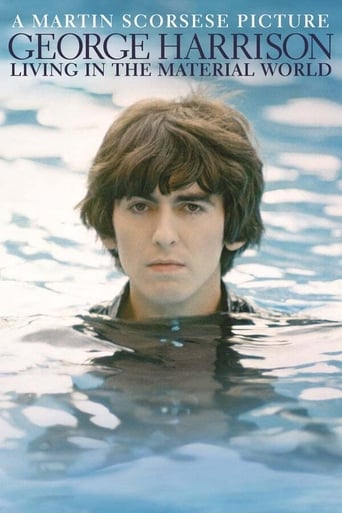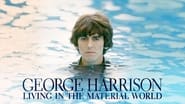sergelamarche
The tidbits about the Beatles are always interesting. Not just because the Beatles were so popular and ground breaking but also because it's unusual lives. Here, Scorsese assembled quite the cast to retell stories about George to fill two films. And still there are some blanks. Fun and enlightening.
dbdumonteil
The title is no misnomer.As George sang in the track from the eponymous album,"by the Lord Sri Krishna's grace (....) my salvation from the material world" .At the time many people laughed at Harrison whom they dismissed as unhip and holier-than-thou.Scorcese's movie is exactly what George would have wanted:a long and winding line of thought of an icon who,little by little ,ditched the material world :an adulated entertainer in the glorious years of the Beatles (to whom he contributed a good handful of classics) ,a peak of musical and spiritual inspiration with his mind-boggling " all things must pass" (which remains,along with "John Lennon/Plastic Ono Band" ,my favorite solo album).In the seventies ,it seems that George was not that interested in carrying on with a career which anyway was on the wane after "material world" ,his last number one .The concert for Bangla Desh was a grand gesture (and Bob Geldof's laurels actually belonged to the ex-Beatle),but the rest of it ,the 1974 tour,the infatuation with racing cars ,the homemade productions ,the Japanese tour,even the marvelous Traveling Wilburys, were minor events .George had warned us on the overlooked B side "the inner light" in the words he set to music on a college professor's request:"without looking out of my Windows ,I could know the ways of Heaven" .His final years were probably the happiest of his life ,with a marvelous wife ,Olivia ,who shared his way of life ,and a son to carry on.Two hundred years after Voltaire,like Zadig,he cultivated his garden while continuing his spiritual quest.His ultimate album,"brainwashed" ,lived up to its name:although terminally ill,the musician produced a cheerful album,full of serenity .More than thirty years after the song,he had learned the "art of dying" ;"I've never seen such a confident patient " a physician said .Like Scorcese's take on Dylan ("no way home" ) ,"living in the material world " is never off the point .Nothing sensational,nothing scandalous,but an absorbing portrayal of a man,who,after conquering the whole world,realized he could "arrive without traveling " and "see all without looking".
Michael O'Keefe
This is Martin Scorsese's elaborate and deliberate profile of George Harrison, who died of cancer in 2001. This documentary explores Harrison's contributions to The Beatles, the Beatles' breakup, his roller coaster solo career, the concert for Bangladesh, the Traveling Wilburys, spirituality, human dignity and his battle with cancer.Among those sharing memories: Olivia Harrison(wife), Dahni Harrison(son), Paul McCartney, George Martin, Ringo Starr, Eric Clapton, Phil Spector, Yoko Ono, Tom Petty, Ravi Shankar, Jackie Stewart and Eric Idle.A few of those also appearing(some via archive footage): John Lennon, Mick Jagger, Stuart Sutcliffe, Pattie Boyd, Julian Lennon, Jeff Lynne, Klaus Voormann, Brian Epstein, Jimi Hendrix, Bob Dylan, Linda McCartney, Mal Evans, Joe Cocker, Neil Aspinall and Maharishi Mahesh Yogi.Just a few of the songs featured(The Beatles and solo): "Don't Bother Me", "If I Needed Someone", "Within You Without You", "Savoy Truffle", "Beware Of Darkness", "The Inner Light", "Something", "While My Guitar Gently Weeps", "Here Comes The Sun", "What Is Life", "My Sweet Lord", "Give Me Love", "Isn't It A Pity", "Wah-Wah", "Dark Horse", "Brainwashed" and "All Things Must Pass".
kdhymes
I can't claim direct knowledge of the topics addressed by many reviewers here, but I can say that I have read just about every significant book published about The Beatles in general, and Harrison in particular. I totally understand the issues people express about this film: long without being either balanced or comprehensive; curiously silent on some key events (perhaps Olivia Harrison's wishes are a factor here?); missing some key points of view (though getting Dylan, for example, to talk about anything in a useful way is notoriously difficult). But I feel I must address a couple of points raised. 1. Re: Concert for Bangladesh. The amount raised by the concert itself was about a quarter of a million dollars. Sales of the iterations of the album and the movie raised about 12 million, to be administered by UNICEF. The money DID go to refugee relief, BUT was delayed by 11 years because of the failure of organizers to apply for tax-exempt status. So... bad planning, but not a scam or a failure. 2. Re: Harrison's relative contribution to the Beatles. On the one hand, the evidence is quite clear that Ringo was far more crucial to the Beatles sound in the studio than Harrison - the band simply did not function well with any other drummer (rumors of McCartney sitting in are based on photos, not the meticulous records kept by Abbey Road; when Ringo quit for 6 weeks in 1968, numerous replacements including Ginger Baker were tried, and no one was able to provide the subtle and generous and dare I say feminine approach that the Beatles suddenly discovered was a key ingredient in their process, causing them to beg for his return). Harrison was great at coming up with carefully planned, often double-tracked parts, which added beauty and flavor at a higher level than McCartney or Lennon could offer (the 15 seconds or so of Harrison on Getting Better, e.g., truly makes the recording). But he was an indifferent electric rhythm guitar player in my opinion. His songs were only occasionally as good as L&M's, however there is no denying the fact, attested to by Martin, Parsons, and others, that Harrison got short shrift in studio time to realize his ideas. It is essential to keep in mind that L&M were given INCREDIBLE amounts of time for the era, virtually unlimited takes after 1965, to get the basic tracks right, and then to try dozens of approaches to the sweetening and vocals. Harrison was never given this opportunity until the last two real albums produced (White Album and Abbey Road), and suddenly his work shows a massive uptick in quality, both of writing and execution (Savoy Truffle, Piggies, Something, Long Long Long, Here Comes the Sun, While My Guitar Gently Weeps - all of these outclass his earlier work by miles). It can't be a coincidence that once the Beatles essentially stopped being a team and became each others' session players, Harrison flourished. Also worth noting that he produced the first truly satisfying album as a solo artist, All Things Must Pass - overly long, but a big hit and a good listen, using in part songs he had been carrying around for a few years. With regard to the contradictions between his lifestyle and his purported spiritual values - in what way is this unusual or even notable? Seems like standard operating procedure for entertainment celebrities to either need a frame of self-justification, or to have trouble avoiding the temptations of riches, or both. I obviously appreciate Harrison's work, but I'm not an uncritical fan - his "middle period" of solo work is pretty awful, just a few songs are keepers; and even Cloud Nine is really a few good songs surrounded by oddly paced, indifferently written material. His last album, Brainwashed, is weird but really interesting, and at a higher level lyrically than anything he had done since All Things Must Pass. He was who he was: not a genius on the level of L&M, but an ingredient in their recorded output that would be sorely missed were we somehow able to remove it. And there is an argument that his presence and his influence enriched the Beatles philosophically, lyrically and musically. They were very competitive: if George was spiritual, well by jove they were going to be spiritual too. A thin veneer of spirituality perhaps, on lives that were primarily about fame and money and art, but again an ingredient that, if not present, would have made the Beatles a very different band.





